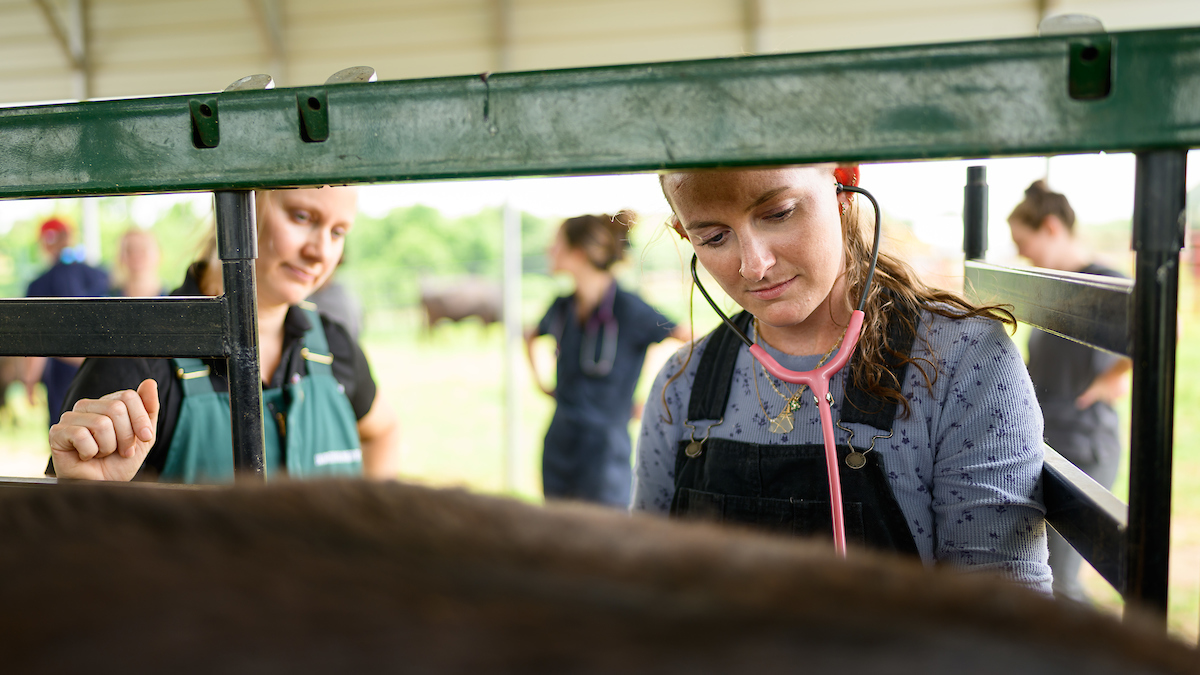NC State Veterinary Researchers Seek to Develop Treatment for Chronic Canine Allergic Diseases
Bruce Hammerberg and Thierry Olivry, researchers at North Carolina State University’s College of Veterinary Medicine, are recipients of $67,474 from the Chancellor’s Innovation Fund to find a new therapy that they hope will resolve chronic allergic diseases in dogs without the often unacceptable side effects of current anti-inflammatory drugs.

Dr. Hammerberg, a professor of immunology-parasitology in the Department of Population Health and Pathobiology, and Dr. Olivry, a professor of immunodermatology in the Department of Clinical Sciences, have been collaborating on research projects as members of the NC State Center for Comparative Medicine and Translational Research.
The grant study—“Allergic Disease Therapy Using Anti-IgE Monoclonal Antibodies from Canine B Cells”—is a translation of Dr. Hammerberg’s ongoing allergic disease research and Dr. Olivry’s focus on canine atopic dermatitis. Dr. Olivry also is a senior clinician in the Dermatology Service with the Randall B. Terry, Jr. Companion Animal Veterinary Medical Center.

“Like people, dogs can suffer from various skin allergies including recurring itch and skin rashes,” says Dr. Olivry. “When the disease can be linked to exposure to specific allergens, such as house dust mites or pollens, desensitization injections—also known as allergen-specific immunotherapy—carried out of an extended period can be effective in a few cases.
“Desensitization is not the answer for most dogs,” Dr. Olivry adds. “A treatment involving a combination of allergen avoidance and anti-inflammatory medication is usually prescribed. The prolonged use of these drugs, such as corticosteroids, can result in side effects, however, including increased thirst and appetite, weight gain, muscle weakness, and a predisposition to infections.”
Dr. Hammerberg says that these same challenges exist for human allergy suffers, but there has been a major breakthrough in the development of a safe and effective therapy using a humanized (engineered to be of the human sequence) mouse monoclonal antibody. This antibody specifically binds and neutralizes human IgE that is responsible for activating inflammation-producing cells responsible for allergy symptoms.
“This product, called Xolair®, has been used safely by millions of allergy patients for more than seven years,” says Dr. Hammerberg. “Our laboratory has developed a mouse monoclonal antibody that specifically binds canine IgE in the same manner as the monoclonal antibody used to develop Xolair®. The one major obstacle remaining in providing the canine equivalent to Xolair® for treatment of allergies in dogs is generating a fully canine monoclonal antibody with the same binding properties as our prototypic anti-canine IgE mouse monoclonal antibody.”
The researchers say two approaches will be used to generate a fully canine monoclonal antibody that duplicates the therapeutic activity of the mouse monoclonal antibody. The first involves molecular engineering of the mouse monoclonal amino acid sequence to be identical to canine immunoglobulin sequence. The second approach will generate canine monoclonal antibodies from canine B cells that have the same anti-IgE epitope specificity as our mouse monoclonal antibody. Once produced, these dog-specific reagents will be tested in a proof-of concept trial to verify if they can prevent relapses of signs of allergy in some canine patients. If they do, further development will continue.
[section_subtitle] About the Fund. [/section_subtitle]
Established in 2010 by NC State with the support of Chancellor Randy Woodson, the Chancellor’s Innovation Fund is used for the development, protection, and advancement of NC State research ideas and discoveries and supports university researchers in developing the commercial potential of the discovery.
Located on NC State University’s Centennial Biomedical Campus, the Center for Comparative Medicine and Translational Research is a community of more than 100 scientists from five NC State colleges. These investigators are involved in collaborative ”One Medicine” studies with government, private, and academic researchers to advance knowledge and practical applications that improve the health of animals and humans.


